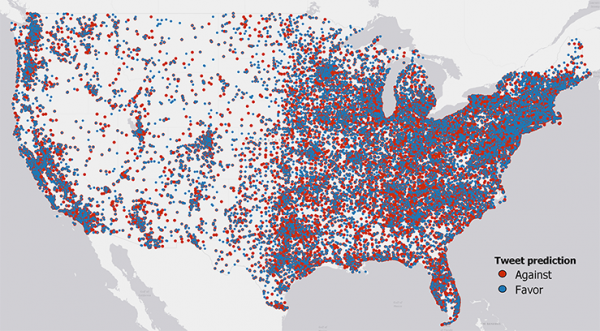A team from Urban Sustainability Research Group of the School for Environment and Sustainability (UM-SEAS) has been studying public tweets to understand climate change and global warming attitudes in the U.S.
Dimitris Gounaridis, is a fellow with the study. The team is mentored by Joshua Newell, and combines work about perceptions on climate change by Jianxun Yang and proprietary level vulnerability assessment by Wanja Waweru.
“This research is timely and urgent. It helps us identify hazards, and elevated risks of flooding and heat, for socially vulnerable communities across the U.S. This risk is exacerbated especially for populations that do not believe climate change is happening,” Dimitris stated.
The research team used a deep learning algorithm that is able to recognize text and predict whether the person tweeting believes in climate change or not. The algorithm analyzed a total of 7 million public tweets from a combination of datasets from a dataset called the U-M Twitter Decahose and the George Washington University Libraries Dataverse. This dataset consists of an historical archive of Decahose tweets and an ongoing collection from the Decahose. The current deep learning model has an 85% accuracy rate and is validated at multiple levels.
The map below shows the prediction of specific users that believe or are skeptical of climate change and global warming. Dimitris used geospatial modeling techniques to identify clusters of American skepticism and belief to create the map.

The tweet stream is sampled in real-time. Armand Burks, a research data scientist with ARC, wrote the Python code that is responsible for continuously collecting the data and storing it in Turbo Research Storage. He says that many researchers across the university are using this data for various research projects as well as classes.
“We are seeing an increased demand for shared community data sets like the Decahose. ARC’s platforms like Turbo, ThunderX, and Great Lakes, hold and process that data, and our data scientists are available, in partnership with CSCAR, to assist in deriving meaning from such large data.
“This is proving to be an effective way to combine compute services, methodology, and campus research mission leaders to make an impact quickly,” said Brock Palen, director of ARC.
In the future, Dimitris plans to refine the model to increase its accuracy, and then combine that with climate change vulnerability for flooding and heat stress.
“MIDAS is pleased that so many U-M faculty members are interested in using the Twitter Decahose. We currently have over 40 projects with faculty in the Schools of Information, Kinesiology, Social Work, and Public Health, as well as at Michigan Ross, the Ford School, LSA and more,” said H.V. Jagadish, MIDAS director and professor of Electrical Engineering and Computer Science.
The Twitter Decahose is co-managed and supported by MIDAS, CSCAR, and ARC, and is available to all researchers without any additional charge. For questions about the Decahose, email Kristin Burgard, MIDAS outreach and partnership manager.
